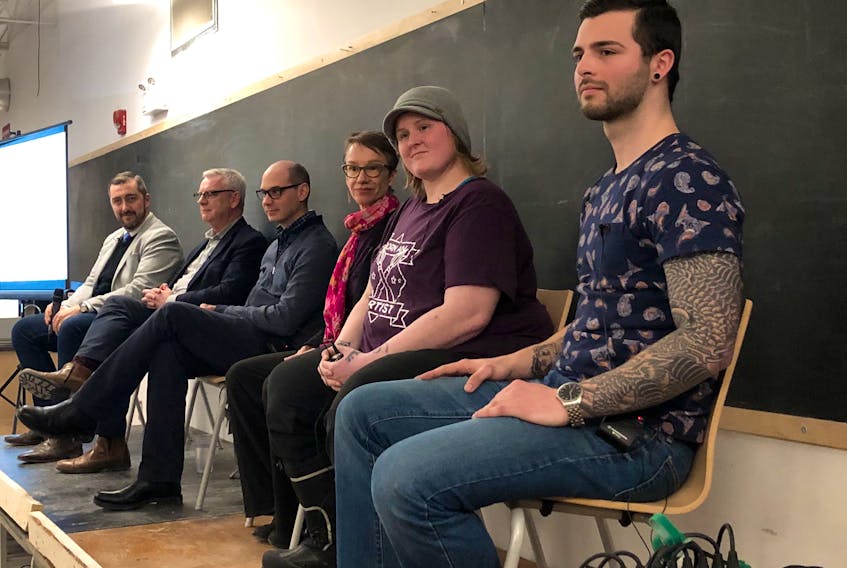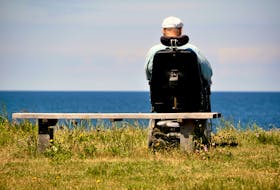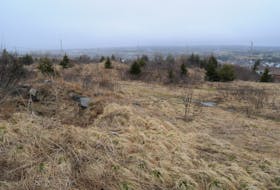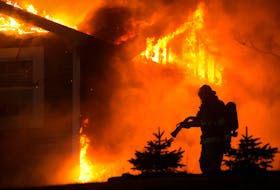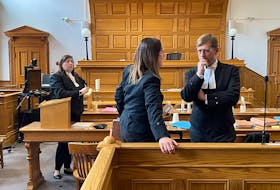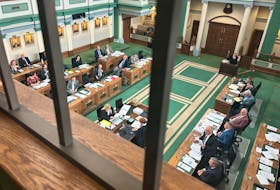ST. JOHN'S, N.L. — A discussion at the St. John’s Community Market Tuesday evening offered a lot to chew on when it comes to food security lessons learned from "snowmageddon."
Food First NL, a non-profit group aiming to improve food security in the province, hosted the gathering.
CEO Josh Smee said the Jan. 17 storm exposed cracks in access to food in the community.

The organization held the event to talk about what can be done to prepare for the next storm, and how food systems can be improved.
Prior to the Tuesday evening panel discussion, the organization gathered ideas from more than 50 people representing government, community agencies and grassroots groups.
They listed some things that didn’t work well during the state of emergency:
- Communications disparities and a lack of consistent, clear information;
- "State of confusion" caused by different municipalities doing different things;
- Accessibility concerns with the most vulnerable not considered in the plans;
- Transportation issues;
- Food not within walking distance for many;
- Affordability and systemic societal issues.
They also listed some recommendations to prepare for future emergencies:
- Create a regional emergency preparedness plan;
- Co-ordination and organization of food system participants, especially food banks;
- Invest in neighbourhoods and leverage neighbourhood connectedness;
- Re-evaluate essential services;
- Consistent communication plan that includes everyone, especially in the absence of power;
- Prioritize roads with essential services.
Smee said one of the big challenges people pointed out about the storm was communication and flow of information.
“We can all remember times when we were seeing contradictory information on Facebook from five different sources.”
He said there needs to be a conversation around how to get information to people during an emergency, especially people who are marginalized and may not have access to mobile data plans, for example.
Yesterday we hosted a series of events @sjfm starting with our community update and celebration, followed by facilitated discussions about how #snowmageddon affected our food system, and ended the day with a panel discussion. Lots of great ideas were brought to the table! pic.twitter.com/7BO6UkWA7P
— Food First NL (@foodfirstNL) February 26, 2020
Transportation was another concern.
“Many of us don’t have anywhere within walking distance that we can get food.”
Smee said the state of emergency might have been easier to endure if most people in the city lived within walking distance of the things they need.
He said that’s made worse by the fact that Newfoundland and Labrador has the highest rate of food insecurity in the country, with at least 15.9 per cent of households struggling to put food on the table on a good day — that’s not taking into account extreme circumstances.
Smee said many people simply didn’t have the financial means to stock up, before the storm, on enough food and supplies to last 72 hours.
He said there needs to be a conversation about how society can better support those who are most vulnerable.
“Many of us don’t have anywhere within walking distance that we can get food.” — Josh Smee
To that end, panelist Joby Fleming, advocacy co-ordinator at Empower, said a liveable wage could alleviate many of these issues.
In the meantime, Fleming said if the hospital is open during emergencies, then so should food banks or the Gathering Place.
Mayor Danny Breen agreed. He said having a plan in place to ensure those social supports remain available during emergencies is important.
Smee suggested having targeted emergency supports for food banks so people who normally wouldn’t require food bank support, but who lose income during extreme weather events, can still obtain food.
The ideas explored in the panel discussion will help inform a food assessment document to be published by Food First NL.
Twitter: @juanitamercer_

